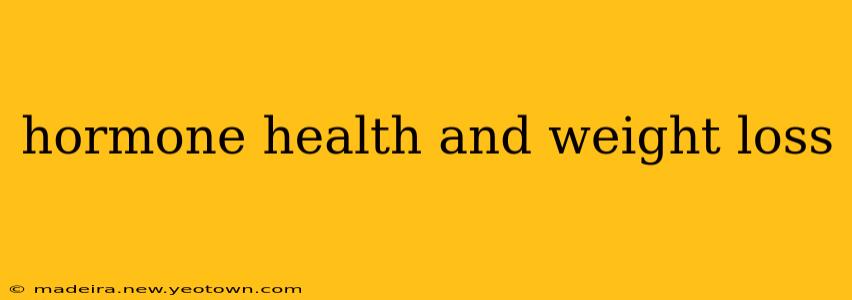The frustrating truth for many is that weight loss isn't always as simple as "calories in, calories out." Our hormones, those incredible chemical messengers, play a significant role in regulating appetite, metabolism, and fat storage. Understanding this intricate relationship between hormone health and weight loss is crucial for achieving sustainable results and overall well-being. This isn't just about dropping pounds; it's about optimizing your body's natural systems for lasting health.
Imagine your body as a finely tuned orchestra. Each hormone is a musician, and when they're in harmony, everything flows smoothly. But when one instrument is out of tune—like an imbalance in your hormones—the whole performance suffers. This can manifest as weight gain, fatigue, mood swings, and other health problems.
Let's delve into the specifics, exploring how various hormones influence weight and what you can do to support hormonal balance for effective and healthy weight management.
What Hormones Affect Weight Loss?
Several key players influence your body's ability to shed pounds. Let's explore some of the most important:
-
Leptin: This hormone, produced by fat cells, signals to your brain that you're full. When leptin levels are low (often due to low body fat), your brain thinks you're starving, leading to increased appetite and slowed metabolism.
-
Ghrelin: Known as the "hunger hormone," ghrelin stimulates appetite. High levels of ghrelin can make it difficult to feel satisfied after eating, leading to overeating.
-
Insulin: This hormone regulates blood sugar levels. Chronic high insulin levels (often due to a diet high in processed carbohydrates and sugars) can promote fat storage, particularly around the abdomen. Insulin resistance, a condition where your cells become less responsive to insulin, is a major contributor to weight gain.
-
Thyroid Hormones (T3 and T4): These hormones regulate metabolism. An underactive thyroid (hypothyroidism) can significantly slow your metabolism, making weight loss challenging. Conversely, an overactive thyroid (hyperthyroidism) can lead to unintentional weight loss.
-
Cortisol: This stress hormone can influence appetite and fat storage. Chronic stress and high cortisol levels can lead to increased cravings for sugary and fatty foods, contributing to weight gain, particularly around the midsection.
How Do Hormonal Imbalances Affect Weight?
Hormonal imbalances disrupt the delicate balance of your metabolic processes. For example:
- Low Leptin: Leads to increased hunger and reduced metabolism, making weight loss difficult.
- High Ghrelin: Causes increased appetite, making it harder to stick to a calorie deficit.
- Insulin Resistance: Promotes fat storage and hinders the body's ability to use stored fat for energy.
- Hypothyroidism: Slows metabolism, making it challenging to lose weight.
- High Cortisol: Increases cravings for unhealthy foods and promotes abdominal fat storage.
How Can I Improve My Hormone Health for Weight Loss?
Improving your hormone health is a multifaceted approach. It requires a holistic strategy incorporating lifestyle changes and, in some cases, medical intervention. Here are some key strategies:
What are the best foods to eat to balance hormones?
Prioritizing a balanced diet rich in whole, unprocessed foods is essential. Focus on lean protein, healthy fats, and complex carbohydrates. Fruits, vegetables, and whole grains are your allies in this quest. Limit processed foods, sugary drinks, and excessive alcohol consumption.
What lifestyle changes can help balance hormones?
Stress Management: Chronic stress wreaks havoc on your hormones. Incorporate stress-reducing practices like yoga, meditation, or spending time in nature. Getting enough sleep is also crucial for hormonal balance. Aim for 7-9 hours of quality sleep each night.
Regular Exercise: Physical activity helps regulate hormones and improves insulin sensitivity. Aim for a combination of cardiovascular exercise and strength training.
When should I see a doctor about hormonal imbalances?
If you suspect a hormonal imbalance, consult a healthcare professional. They can perform tests to determine if you have a thyroid problem, insulin resistance, or other hormonal imbalances and recommend appropriate treatment. Remember, this is not a DIY project; seeking professional guidance is vital for accurate diagnosis and personalized treatment.
Conclusion: The Journey to Hormonal Harmony
The path to weight loss, when influenced by hormonal imbalances, requires a nuanced and holistic approach. It’s about understanding your body's unique signals and working with it, not against it. By addressing underlying hormonal issues and adopting a healthy lifestyle, you can achieve sustainable weight loss and improve your overall well-being. Remember, it’s a journey, not a race, and seeking professional guidance is key to success.

